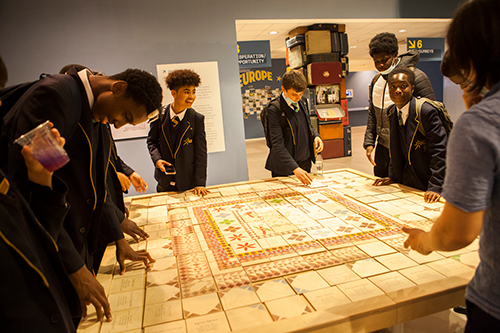The Migration Museum
Educating school children about Britain’s migration story
The Migration Museum was set up to establish what it refers to as “Britain’s missing museum” – namely one that put Britain’s migration story at centre stage.

Credit Elzbieta Piekacz, Migration Museum
Its team creates resources and runs workshops at its exhibition space in London, and by travelling to schools or delivering online sessions, to facilitate informed conversation around migration among children and young people. It also trains teachers how to approach teaching about migration across all parts of the curriculum. It leads with individual migration stories with an emphasis on lived experience.
All its sessions are conducted in a circle, with the aim that all participants and facilitators are equal within the session.
Since 2020, the Museum has reached some 17,500 students, mainly secondary and key stage 4 but also some younger children. Some 84% of students said they found the workshops highly educational, 76% of students found their visit engaging and 81% said that they had a better understanding of migration after participating in museum activities.
Feedback shows that 100% of teachers were satisfied with the content and relevance of the workshops.
Each workshop costs £260 to run, and the charity charges schools £150 where they can afford it.
The charity has a partnership with the Teachfirst Summer Project to engage in coproduction of learning materials and to help in its understanding of the support needed by teachers.
It also shares best practice through its Migration Network, which includes hundreds of people from institutions within museums, galleries, and the charity and education sectors.
Charity Awards judge Karin Woodley, chief executive of Cambridge House, said the project was innovative in that it approaches the subject of migration in terms of the development of the UK, rather than focusing on individual migrant populations. It was a “difficult and potentially contentious area of work with excellent knowledge-sharing and outcomes,” she said.
“The other thing that’s unusual, and very hard to do in schools, is the cross-curriculum approach – training teachers to understand that migrant history across all areas of the curriculum.”
Judge André Clarke, director of charity development at Lloyds Bank Foundation, added that the use of storytelling is both simple and powerful, and highlighted the importance of the project “in the context of the current toxic and inflammatory conversation about migration”.
CC reg no. 1153774

